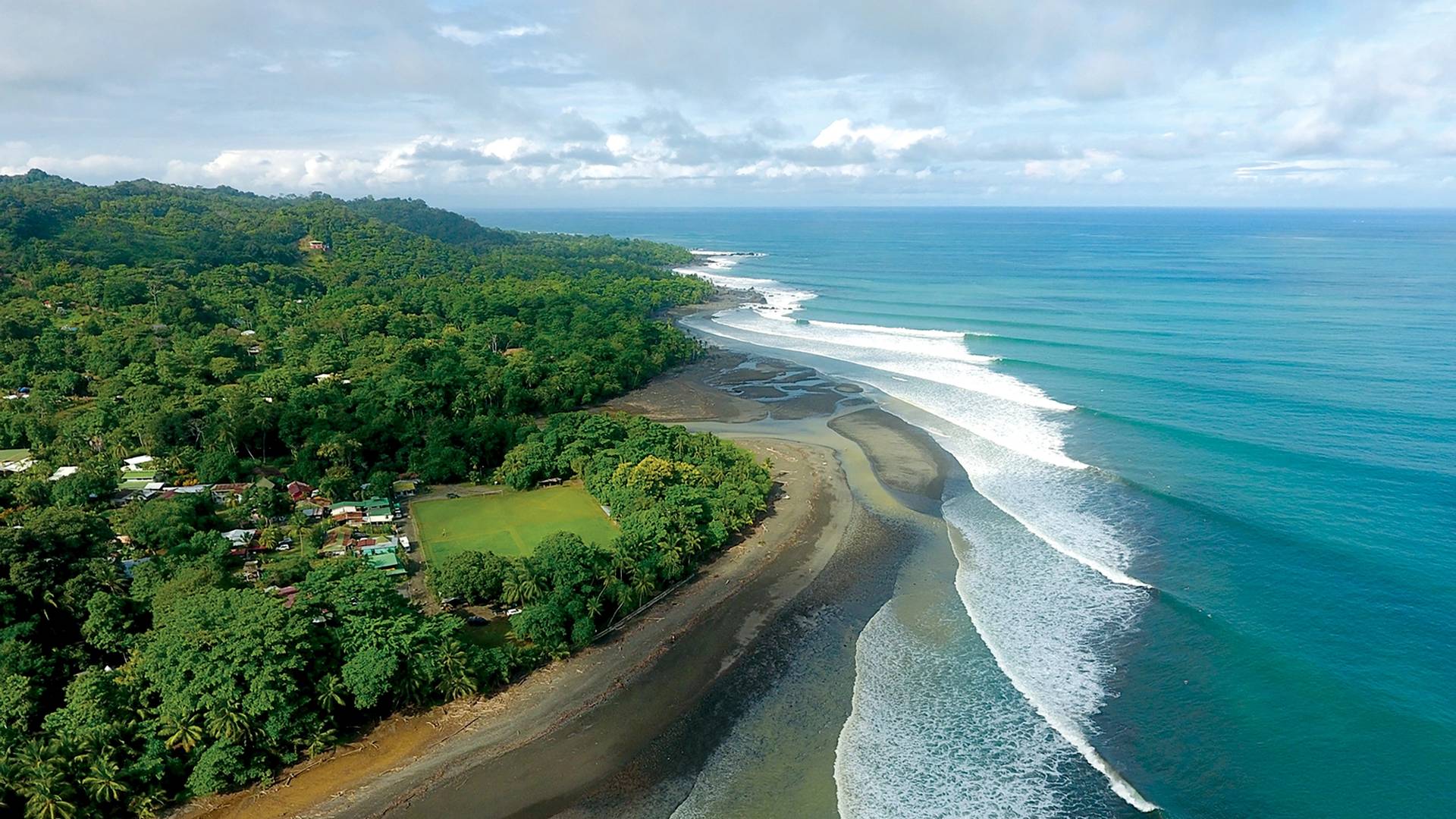Golfo Dulce
- j
- f
- m
- a
- m
- j
- j
- a
- s
- o
- n
- d
Positives
- Pavones ultra-long pointbreak
- Quality Matapalo rights
- Calm winds
- Exotic rainforest wildlife
Negatives
- Crowded and Inconsistent
- Intense rainy season
- Lack of roads
- Tropical diseases and insects
Golfo Dulce surf travel guide
Golfo Dulce (Sweet Gulf) is a bite-sized cul-de-sac on Costa Rica's southern extremity that cradles one of the sweetest waves on the planet. Pavones is famed for ruler-edged, racetrack lefts that hug the sand and boulder jungle fringe when just the right angle SSW swells penetrate the golfo. Top-drawer, world-class waves rarely come without a world-class crowd and people make the harsh 10 hour journey from San Jose on the right forecast. On the opposite side of the gulf, righthanders peel down some sections in front of eco-lodges who access the incredible wildlife that lives in the National Park, plus there are more options down to the Panamanian border. This zone is all about one wave for more experienced surfers, although as usual, CR always has options for beginners in the vicinity.
Surf spots in Golfo Dulce
Research the 9 surf breaks in Golfo Dulce and discover what spots suit the current conditions.
Break lowdown
We’ve collated the wave data giving you a unique insight into the 9 breaks in Golfo Dulce.
When to go
Surf and weather statistics to help plan your surf trip to Golfo Dulce
- jan
- feb
- mar
- apr
- may
- jun
- jul
- aug
- sep
- oct
- nov
- dec
Library
Helpful surf travel videos and articles featuring Golfo Dulce.
Travel Information
General
- Current Time
- Tourists
- 3,017,000
- Population
- 5,094,118
- Tourist Info
- Tourist Info
Security
Health
Money
- Currency
- CRC
- Exchange rate
- $1 = 580 CRC CRC
Cost of living
Communication
- Dialing in
- +506
- Dialing out
- 00
- Emergencies
- 911
- Language
- Spanish, Creole
Electricity
- Plug Type
- ab
Visas
Most countries do not need a visa for a visit of up to 90 days. For more details visit. Dep tax = $29
Getting There
Two airlines fly from Juan Santamar’a International Airport (SJO) to Aeropuerto de Golfito (GLF), but some planes are too small to carry bigger boards. Tracopa has a bus service from San Jose to Golfito costing $5 for the 8h trip. Pavones is a further 2h bounce in a 4WD taxi.
Getting Around
Apart from the main highway, roads are rare and are frequently washed out during the rainy season, so you will need a 4WD. You don’t actually need a car, as it’s easier to use the dirt-cheap public transport to Pavones and then hire pangas over to Matapalo and Punta Banco, a much faster way of getting around, but pricey.
Accommodation
Quepos & Manuel Antonio have dozens of hotels. Large choice in Playa Matapalo and Dominical from cheap camping to all inclusive surf camps. Drake Bay area is more expensive. A typical food bill would be $12-15.
Activities
Abundant wildlife. Manuel Antonio, Marino Ballena and Corcovado National Parks deserve a visit. Canopy Safari in Manuel Antonio ($85). SUP and kayak tour the waterways. Great night life in Quepos, quieter in Dominical.
Hazards & hassles
Mind the rocks, especially at low tide Matapalo spots. Crowds at Pavones and Matapalo get thick and the locals/expats get angry at times. Malaria tablets are necessary. Sea lice, jellyfish and swarms of daytime feeding mosquitoes, have caused a few cases of Dengue fever.
Handy Hints
English is widely spoken. Plenty of surf shops in Quepos and Dominical. Renting a board is easy, cheap (from $10/day) and often a good solution. Booties can be useful to walk on reef. It always pays to get up early. Take mosquito repellent and hiking boots.
Due to global pandemic, Visas, Getting There, Getting Around or Accommodation information and pricing may have changed. Always check Government Travel Advice before travelling.













